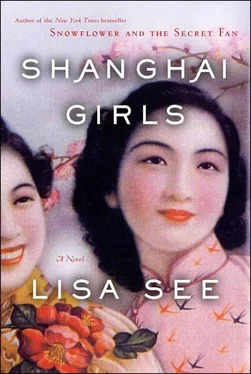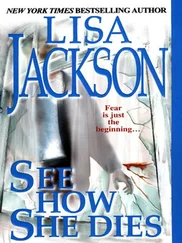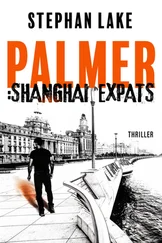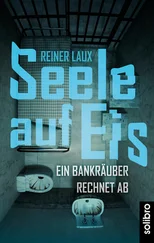“Not that I’ve seen. The old man keeps insisting Sam run the rickshaw rides when China City opens. He wants Sam to be a puller. Sam doesn’t want to do it.”
“Who would?” I shudder.
“Not here, not anywhere,” May agrees. “Not even if it’s just an entertainment for people.”
I wouldn’t mind talking about Sam a bit more, but May circles back to the problem of her husband.
“You’d think they’d treat him like the other boys around here and have him work with his father after school. He could help Sam and me unpack crates and put merchandise on the shelves for when China City opens, but the old man insists that Vern go straight home to the apartment to do his homework. I think all he does is go to his room and work on his models. And not very well from what I can see.”
“I know. I see more of him than you do. I’m with him every day.” I don’t know if May hears the sourness in my voice, but I do and I hurry to hide it. “Everyone knows a son is precious. Maybe they’re preparing him to take over the businesses one day.”
“But he’s the youngest son! They aren’t going to let him do that. It wouldn’t be right. But Vern’s got to learn how to do something. It’s like they want to keep him a little boy forever.”
“Maybe they don’t want Vern to leave. Maybe they don’t want any of us to leave. They’re just so backward. The way we all live together, the way the businesses are kept within the family, the way they keep their money hidden and protected, the way they don’t give us any spending money.”
That’s right. May and I don’t receive a household allowance. Of course, we can’t say that we want our own money to escape from this place and start over again.
“It’s like they’re a bunch of bumpkins from the countryside,” May says bitterly. “And the way Yen-yen cooks,” she adds almost as an afterthought. “What kind of a Chinese woman is she?”
“We don’t know how to cook either.”
“But we were never expected to cook! We were going to have servants for that.”
We sit and think about that for a while, but what’s the point of dreaming about the past when it’s gone? May looks over to Sanchez Alley. Most of the children have returned to their apartments. “We’d better get back before Old Man Louie locks us out.”
We walk back to the apartment arm in arm. My heart feels lighter. May and I are not only sisters but sisters-in-law as well. For thousands of years, daughters-in-law have complained about the hardship of life in their husbands’ homes, living under the iron fists of their fathers-in-law and under the calloused thumbs of their mothers-in-law. May and I are very lucky to have each other.
Dreams of Oriental Romance
ON JUNE 8, almost two months after we arrived in Los Angeles, I cross the street at last and enter China City for the Grand Opening. China City is enclosed by a miniature Great Wall-although it’s hard to call it “Great” when it looks just like cardboard cutouts placed on top of a narrow wall. I pass through the main gate and encounter a thousand or so people grouped together in a big open area called the Court of the Four Seasons. Dignitaries and movie stars give speeches, firecrackers spit and crackle, a dragon parades, and lion dancers frolic. The lo fan look glamorous and fashionable: the women in silks and furs, gloves and hats, and shiny lipstick; the men in suits, wing tips, and fedoras. May and I wear cheongsams , but as sleek and beautiful as we look in them, I feel we appear outdated and foreign compared with the American women.
“Dreams of Oriental romance are woven like silk threads through the little fabric that is China City,” Christine Sterling proclaims from the stage. “We ask Your Honorable Person to see the brilliant colors of its hopes and ideals and to forget the imperfections in its creation, because these will fade with the passing years. Let those who have peopled the generations of China’s existence, who have survived catastrophes of every kind in their motherland, find a new haven, where they can perpetuate their desire for collective identity, follow in the footsteps of their ancestors, and ply the trades and arts of their heritage in all tranquillity.”
Oh, brother .
“Leave the new world of rush and confusion behind,” Christine Sterling goes on, “and enter the old world of languorous enchantment.”
Really?
The shops and restaurants will open their doors for business as soon as the speeches finish, and those who work here-Yen-yen and me included-will need to hurry to take their positions. As we listen, I hold Joy in my arms so she can see what’s happening. With the undulating crowds and all the jostling, we get separated from Yen-yen. I’m supposed to go to the Golden Dragon Café, but I don’t know where it is. How can I get lost in just one block surrounded by a wall? But with so many blind alleys and narrow paths that twist and turn, I’m completely confused. I walk through doorways only to find myself in a courtyard with a goldfish pond or in a stand selling incense. I press Joy tight against my chest and squeeze up against the wall as the rickshaws-emblazoned with the Golden Rickshaws’ logo-haul laughing lo fan through the alleys, the pullers calling, “Coming through! Coming through!” These aren’t like any rickshaw pullers I’ve ever seen. They’re all dolled up in silk pajamas, embroidered slippers, and brand-new coolie hats made from straw. And they aren’t Chinese. They’re Mexican.
A little girl costumed like a street urchin-only cleaner-wiggles through the crowd, handing out maps. I take one and open it, looking for where I need to go. The map shows the big sights: the Steps of Heaven, the Harbor of Whangpoo, the Lotus Pool, and the Court of the Four Seasons. At the bottom of the map, two men dressed in Chinese robes and slippers drawn in black ink bow to each other. The caption reads: “If you will condescend your august self to enlighten our humble city, we greet you with sweetmeats, wines, and music rare, and also objets d’art that will delight your noble eyes.” Nothing on this map shows any of Old Man Louie’s enterprises, each of which has Golden in its name.
China City isn’t like Shanghai. It isn’t like the Old Chinese City either. It isn’t even like a Chinese village. It looks a lot like the China May and I used to see in movies brought to Shanghai from Hollywood. Yes, it’s all exactly as May described during our walks together. Paramount Studios has donated a set from Bluebeard’s Eighth Wife , which has now been converted into the Chinese Junk Café. Workmen from MGM have meticulously reassembled Wang’s Farmhouse from The Good Earth , right down to the ducks and chickens in the yard. Behind Wang’s Farmhouse winds the Passage of One Hundred Surprises, where those same MGM carpenters have converted an old blacksmith shop into ten novelty boutiques, selling jewel trees, scented teas, and fringed and embroidered “Spanish” shawls made in China. The tapestries in the Temple of Kwan Yin are reputed to be thousands of years old, and the statue was supposedly saved from the bombing of Shanghai. In fact, like so many things at China City, the temple was constructed from more leftover sets from MGM. Even the Great Wall came from a movie, although it must have been a western in which a fort needed defending. Christine Sterling’s determination to repackage her Olvera Street concept into something Chinese has been matched by her total lack of understanding of our culture, history, and taste.
My brain tells me I’m safe. Too many people mill about for anyone to try to trap or hurt me, but I’m nervous and scared. I hurry down another blind alley. I hold Joy so tightly she starts to cry. People stare at me as though I’m a bad mother. I’m not a bad mother , I want to shout. This is my baby . In my panic I think, if I can find the front entrance, then I’ll be able to find my way back to the apartment. But Old Man Louie locked the door on our way out and I don’t have a key. Agitated and apprehensive, I put my head down and shove through the people.
Читать дальше












